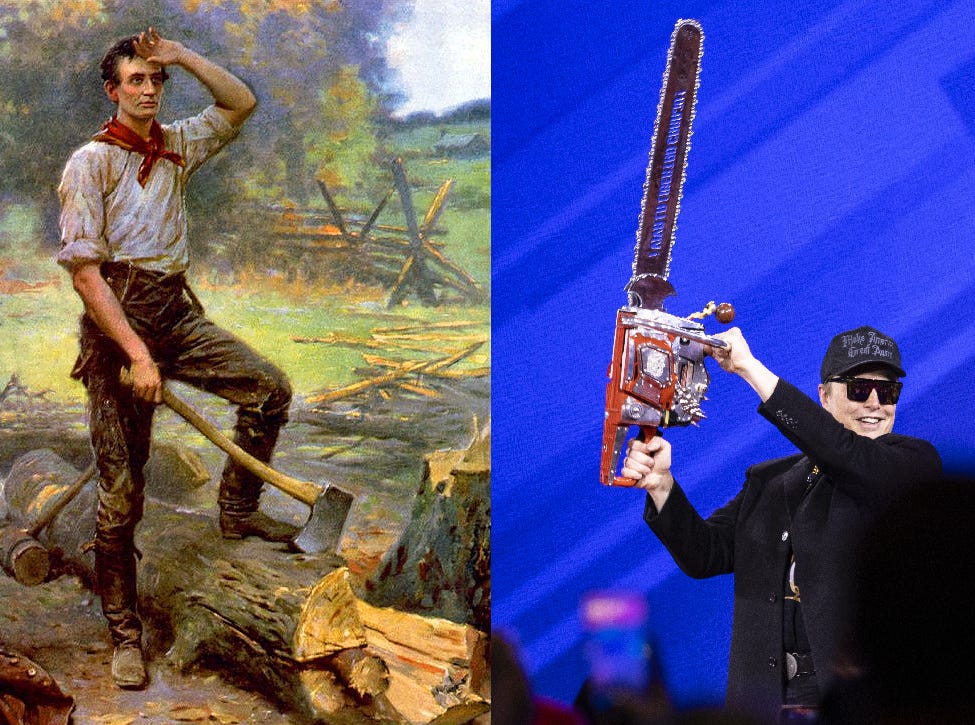Elon Musk announces the formation of a new national political party to replace the worn-out parties of the past. It will be an unprecedented accomplishment, he says. President Donald Trump agrees it would be a novelty: “It’s always been a two-party system. . . . Three parties have never worked.”
Wrong. A third party elected Abraham Lincoln in 1860.
Musk and Trump may be forgiven the slip. The former was schooled abroad, the latter may have slept through civics classes, and both, it is said, are prone to exaggeration. But why hasn’t the error been corrected by the mainstream press? A journalist for the Wall Street Journal informs us that “a third-party candidate has never become president”, and a pair of New York Times reporters tell their readers that “building a new political party . . . is enormously difficult and expensive. Small wonder it hasn’t been done.”
But it did happen, with Lincoln’s help, in 1856. At the time, the Whigs and Democrats were wracked by internal divisions between their northern and southern branches. Seizing the opportunity, the new Republican Party nominated John Fremont, senator from the new state of California, as its candidate for president. Coming out of nowhere, Fremont finished second behind Democrat James Buchanan.
Decisive to Fremont’s success was the flight of Lincoln and other influential Whigs to the Republican party banner. Lincoln, a former Whig congressman from Illinois and still a Whig when he debated Democrat Stephen Douglas during his race for a seat in the U.S. Senate in 1854, attended the 1856 Republican convention that selected the state’s delegates to the national gathering of 22 Republicans held at the Willard Hotel in Washington, D.C. Four years later, the Republican baton was handed to Lincoln, and he was elected president after the electoral college vote split four ways among Lincoln, John Bell (a Whig remnant calling itself the Constitutional Union Party), John Breckenridge (southern Democrat), and Douglas (northern Democrat).
Can this happen again? Twentieth-century history suggests otherwise. In 1912, Teddy Roosevelt got the highest third-party vote since Lincoln, but he simply divided the Republicans and handed the election to Democrat Woodrow Wilson. Ross Perot looked like he might beat Bill Clinton and George H. W. Bush in the summer of 1992, but on Election Day he ran a distant third and once again may have been decisive in lifting a Democrat to victory.
But how about the new politics of the 21st century? Will established parties split into factions or degenerate? Are the sectional divides, partisan divisions, political assassinations, courtroom abuses, and internal party bickering precursors of an entirely new party system?
Not knowing the answer, I asked HAL, my favorite AI tool, for a prediction. Here is what HAL said:
Alexandria Ocasio-Cortez (AOC), Bernie Sanders, Zohran Mamdani, and one million cheering undergraduates will walk out of the next Democratic National Convention to form a Progressive-Socialist Party in protest. An aging remnant of old-time Democrats, union leaders, upwardly mobile black voters, and pro-Israeli moderates will unite behind Maryland Governor Wes Moore, New Jersey Senator Cory Booker, or a rising star from either Georgia or Texas. Meanwhile, swaths of the Republican Party—tariff-fearing economists, debt-fearing conservatives, pro-immigration moderates, anti-communist cold-warriors, and Mike Pence—will walk out of the Republican National Convention when Trump passes the populist mantle to J.D. Vance.
That’s what HAL said. I am loath to question his prognostications, but it’s possible I caused him to hallucinate.
Paul E. Peterson is a senior fellow at the Hoover Institution and the Henry Lee Shattuck Professor of Government at Harvard University.





Certainly, HAL is entitled to his/her/its opinion. If the Democrats have any say, HAL will probably be allowed to vote, too. 🙄
This article strikes me as a false comparison and condescending at the same time. Slavery was a top issue and the subject of legislation at least 4 decades prior to the 1860 election (Missouri Compromise of 1820). The discussion had been prominent in people's minds since the founding. Compare that today to the small group of voters who identity the national debt as a top priority. In addition, there was a North/South divide that facilitated Republicans gaining vast numbers of Northern Dems as well as other parties (Whigs, No Nothings). Even Frederick Douglass, who didn't really believe that slavery had a political solution, supported Lincoln. If you look at the folks who care about debt/deficits, they are predominately Republican voters. All Musk is likely to do is take enough of those votes away to put Democrats in charge again. How will that work out for fiscal conservatives? I would suggest about as well as libertarians giving the Senate to Dems in 2016 when they got Warnock elected to the GA senate seat. It seems arrogant to me to tout one's superior knowledge of American history to suggest what happened in the lead up to the 1860 election has any similarities to America in 2025. Even the Fed is downplaying the cost of the debt while they fret about tariff related potential inflation. I would posit the more likely scenario that Musk's theatrics, even though well intentioned, will get us a repeat of the Clinton victory of 1992 because Perot siphoned off so many Republican votes.